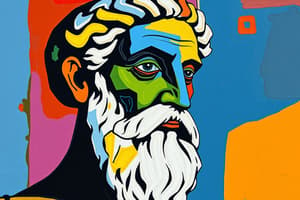Podcast
Questions and Answers
What was Socrates known for in philosophical discourse?
What was Socrates known for in philosophical discourse?
- Writing extensive philosophical texts
- Developing complex mathematical theories
- Engaging in systematic questioning about the self (correct)
- Establishing the first philosophical school
According to St. Augustine, what is the supreme virtue in relation to love?
According to St. Augustine, what is the supreme virtue in relation to love?
- Love for other people
- Love for God (correct)
- Love for oneself
- Love for physical objects
What does St. Augustine identify as the source of all reality and truth?
What does St. Augustine identify as the source of all reality and truth?
- Human reasoning
- The collective consciousness of humanity
- Nature and its laws
- God (correct)
Which component of the soul is associated with rational thought, according to Plato?
Which component of the soul is associated with rational thought, according to Plato?
What philosophical view did Descartes support regarding the nature of humans?
What philosophical view did Descartes support regarding the nature of humans?
What is the key flaw associated with excessive love for other people, according to St. Augustine?
What is the key flaw associated with excessive love for other people, according to St. Augustine?
What is the process associated with deduction as defined by Plato?
What is the process associated with deduction as defined by Plato?
What initiates the Socratic Method employed by Socrates?
What initiates the Socratic Method employed by Socrates?
What does Descartes mean when he states, 'Cogito ergo sum'?
What does Descartes mean when he states, 'Cogito ergo sum'?
How does Locke describe the process of knowledge acquisition?
How does Locke describe the process of knowledge acquisition?
What representation does the 'Allegory of the Cave' provide in terms of knowledge?
What representation does the 'Allegory of the Cave' provide in terms of knowledge?
What were the two main types of knowledge according to Hume?
What were the two main types of knowledge according to Hume?
In the context of the mind-body problem, how did Descartes view the body?
In the context of the mind-body problem, how did Descartes view the body?
What is the essence of the appetitive aspect of human nature?
What is the essence of the appetitive aspect of human nature?
What was St. Augustine's initial stance towards Christianity?
What was St. Augustine's initial stance towards Christianity?
Which component is essential for achieving justice in the human person according to Plato?
Which component is essential for achieving justice in the human person according to Plato?
What does the concept of 'TABULA RASA' refer to?
What does the concept of 'TABULA RASA' refer to?
According to David Hume, how do humans attain knowledge?
According to David Hume, how do humans attain knowledge?
Which of the following does Kant propose about the mind?
Which of the following does Kant propose about the mind?
What type of law is defined as ‘eternally true and should always be followed’?
What type of law is defined as ‘eternally true and should always be followed’?
What are actions deemed praiseworthy referred to as according to the Law of Opinion?
What are actions deemed praiseworthy referred to as according to the Law of Opinion?
What aspect of the mind does Kant emphasize in his theory?
What aspect of the mind does Kant emphasize in his theory?
Which principle indicates that satisfaction is derived from immediate pleasure without societal constraints?
Which principle indicates that satisfaction is derived from immediate pleasure without societal constraints?
What does the term ‘self’ indicate in the context of impressions according to Kant?
What does the term ‘self’ indicate in the context of impressions according to Kant?
What role does the ego play in personality structures?
What role does the ego play in personality structures?
Which structure of personality is primarily concerned with moralistic principles?
Which structure of personality is primarily concerned with moralistic principles?
What is the primary basis of children's behavior in the preparatory stage according to social behaviorism?
What is the primary basis of children's behavior in the preparatory stage according to social behaviorism?
Who proposed that the 'self' is not a distinct entity but rather a label for behaviors?
Who proposed that the 'self' is not a distinct entity but rather a label for behaviors?
Which of the following best describes the superego's function within the personality structure?
Which of the following best describes the superego's function within the personality structure?
What aspect of social behaviorism emphasizes the importance of the environment?
What aspect of social behaviorism emphasizes the importance of the environment?
Which stage involves children primarily learning through imitation?
Which stage involves children primarily learning through imitation?
What does the term 'moralistic principle' refer to in the context of personality structures?
What does the term 'moralistic principle' refer to in the context of personality structures?
What stage of development is characterized by children role-playing and pretending to be other people?
What stage of development is characterized by children role-playing and pretending to be other people?
According to neuroscience, what is primarily responsible for man's thoughts, feelings, and behavior?
According to neuroscience, what is primarily responsible for man's thoughts, feelings, and behavior?
What concept does Maurice Merleau-Ponty assert about the relationship between mind and body?
What concept does Maurice Merleau-Ponty assert about the relationship between mind and body?
At what age range do children develop the ability to respond to multiple members of their social environment?
At what age range do children develop the ability to respond to multiple members of their social environment?
Which philosopher argued that the 'self' is composed of the 'I' self and the 'Me' self?
Which philosopher argued that the 'self' is composed of the 'I' self and the 'Me' self?
What does Erving Goffman's concept of impression management primarily deal with?
What does Erving Goffman's concept of impression management primarily deal with?
What term describes the idea that the self is not present at birth but develops through experiences?
What term describes the idea that the self is not present at birth but develops through experiences?
What is meant by saying 'one’s body is his opening toward his existence to the world'?
What is meant by saying 'one’s body is his opening toward his existence to the world'?
Flashcards are hidden until you start studying
Study Notes
Philosophical Perspectives
- The Greeks were the first to seek natural explanations for events.
- Socrates, the father of Philosophy, used the Socratic method to reveal misconceptions and uncover the truth.
- Plato believed the soul is composed of three parts: reason, spirited, and appetitive.
- Plato believed that justice in the human person can only be attained when the three parts of the soul work harmoniously.
- St.Augustine believed God is the source of all reality and truth.
- St.Augustine believed in the sinfulness of man and that love for physical objects leads to sins of greed, jealousy, and pride.
- René Descartes, the father of Modern Philosophy, developed the theory of mind-body dualism.
- Descartes believed that the existence of the self is proven through the thought "Cogito Ergo Sum" which means "I think therefore I am."
- Descartes believed that we can only know what we’ve intuited and deduced.
- John Locke believed that knowledge is acquired through experiences and is not innate.
- Locke described the mind at birth as a “tabula rasa" or a blank slate.
- Locke believed that individuals are born with natural rights and freedom.
- According to David Hume, the mind receives materials from the senses (impressions) and calls them “perceptions.”
- Hume believed that impressions are more powerful than existing ideas.
- Hume described the mind as a series of perceptions, and we do not have an essential self.
- Immanuel Kant believed that the mind is not just a passive receiver of sense experience, it is also an active participant.
- Kant believed that the ability to organize impressions of the world is how we know the self.
- Sigmund Freud believed that the human mind is composed of three parts: the id, the ego, and the superego.
- Freud described the id as the part of the unconscious mind driven by pleasure.
- Freud described the ego as the part of the mind that mediates the id and the superego.
- Freud described the superego as the part of the unconscious mind that represents moral and ideal aspects of personality.
Sociological Perspectives
- Sociology aims to understand the influence of the social environment on human behavior.
- George Herbert Mead is known for the theory of social behaviorism.
- George Herbert Mead believed that the self develops through an interaction with the social environment.
- George Herbert Mead explained that each person undergoes three stages in their development: the preparatory stage, the play stage, and the game stage.
- Mead argued that the "I" self is our spontaneous and creative side, and the "Me" self is our social self that acts according to society’s expectations.
- Gilbert Ryle believed that the self is not an entity but rather a convenient way to describe all the behaviors that people exhibit.
- Patricia Churchland and Paul Churchland advanced the idea that the self is a product of the physical brain and its neurological functions.
- Maurice Merleau-Ponty asserted that the mind and body are intertwined and cannot be separated.
Erving Goffman
- Erving Goffman is known for the concept of "impression management."
- Goffman argues that humans behave differently in different situations to manage how others see them.
Studying That Suits You
Use AI to generate personalized quizzes and flashcards to suit your learning preferences.




